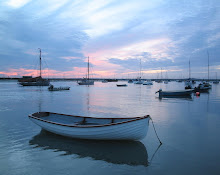
One of the books I read while confined to barracks by the appalling weather this weekend was Raven Black by Ann Cleeves. I'd read Cleeves's Hidden Depths earlier this year, and reviewed it here. As soon as I'd finished that one, I popped Raven Black in my Amazon shopping trolley, intrigued by the idea of a quartet of novels set on an island - in this case Shetland.
Before getting round to opening Raven Black, however, another island-based crime novel pushed its way forcefully to the top of the pile - Losing You by Nicci French, which is set on an island heavily based on Mersea, where I live. Thinking about Losing You (which I reviewed here) gave rise to some more general musings about the advantages of setting a crime novel on an island.
Clearly, an island gives a writer small, complex community, in which many of the inhabitants will be interrelated; where resentments can fester - perhaps for generations; where secrets have to be kept more deeply hidden than in a less close-knit society; and from which quick escape can be physically difficult or impossible.
In today's age of instant mass communication, a remote island gives a perfect opportunity for recapturing realistically some essential elements from the world of 'golden age' detective fiction which would seem impossibly stilted on the modern mainland.
Islands (even not especially remote ones) often suffer from patchy mobile phone signals and restricted Internet access; they are cut off both literally and maybe socially from the rest of the world; roads may be difficult, police numbers low (and officers inexperienced in murder inquiries); there can be a stark distinction - even open hostility - between natives and incomers. All perfect for the the development of plot and a rich cast of interesting characters. And all cleverly exploited by Ann Cleeves in Raven Black, which I thoroughly enjoyed.
I've never visited the Shetland isles - Orkney is as far north in the UK as I've ventured thus far. But Raven Black has certainly inspired me to investigate, and it seems that I'm not the only one. The Shetland tourist industry is delighted by the effect that Cleeves' first two Shetland novels are having (and two more are in the pipeline). You can read about it all on her website.
Raven Black introduces us Inspector Jimmy Perez, an appealing detective who, despite his exotic name, is actually a native of Fair Isle - and thus at once an islander and an outsider (Fair Isle lies midway between Orkney and Shetland).
It's January, and everyone's looking forward to the Up Helly Aa festival. Heavy snow has fallen. A beautiful and enigmatic sixteen-year-old is found dead in a field one bitterly cold morning. Her murder raises memories of the unsolved disappearance, some years before, of a young girl whose body was never found. Could the two crimes be connected?
I'm always overcome with nerves at the prospect of reviewing a crime novel - the risk of inserting accidental spoilers is extreme. So I'll leave it to the experts: there are reviews by Maxine Clarke (aka Petrona) here and by Sunnie Gill here - both on the excellent Euro Crime site.
Before getting round to opening Raven Black, however, another island-based crime novel pushed its way forcefully to the top of the pile - Losing You by Nicci French, which is set on an island heavily based on Mersea, where I live. Thinking about Losing You (which I reviewed here) gave rise to some more general musings about the advantages of setting a crime novel on an island.
Clearly, an island gives a writer small, complex community, in which many of the inhabitants will be interrelated; where resentments can fester - perhaps for generations; where secrets have to be kept more deeply hidden than in a less close-knit society; and from which quick escape can be physically difficult or impossible.
In today's age of instant mass communication, a remote island gives a perfect opportunity for recapturing realistically some essential elements from the world of 'golden age' detective fiction which would seem impossibly stilted on the modern mainland.
Islands (even not especially remote ones) often suffer from patchy mobile phone signals and restricted Internet access; they are cut off both literally and maybe socially from the rest of the world; roads may be difficult, police numbers low (and officers inexperienced in murder inquiries); there can be a stark distinction - even open hostility - between natives and incomers. All perfect for the the development of plot and a rich cast of interesting characters. And all cleverly exploited by Ann Cleeves in Raven Black, which I thoroughly enjoyed.
I've never visited the Shetland isles - Orkney is as far north in the UK as I've ventured thus far. But Raven Black has certainly inspired me to investigate, and it seems that I'm not the only one. The Shetland tourist industry is delighted by the effect that Cleeves' first two Shetland novels are having (and two more are in the pipeline). You can read about it all on her website.
Raven Black introduces us Inspector Jimmy Perez, an appealing detective who, despite his exotic name, is actually a native of Fair Isle - and thus at once an islander and an outsider (Fair Isle lies midway between Orkney and Shetland).
It's January, and everyone's looking forward to the Up Helly Aa festival. Heavy snow has fallen. A beautiful and enigmatic sixteen-year-old is found dead in a field one bitterly cold morning. Her murder raises memories of the unsolved disappearance, some years before, of a young girl whose body was never found. Could the two crimes be connected?
I'm always overcome with nerves at the prospect of reviewing a crime novel - the risk of inserting accidental spoilers is extreme. So I'll leave it to the experts: there are reviews by Maxine Clarke (aka Petrona) here and by Sunnie Gill here - both on the excellent Euro Crime site.
Coming from outside the ranks of the truly dedicated crime devotees, as I do, unlike Maxine I welcomed all the atmosphere and didn't find the centre of the novel flagged at all. Raven Black was planned as the first in a quartet of Shetland-based novels, so it's hardly surprising that Cleeves takes her time with some detailed scene-setting. And although it's part of the British Isles, Shetland will be unfamiliar territory for the vast majority of readers in the UK, let alone those from the rest of the world, so I appreciated the way that Cleeves interweaves and underpins her plot with a substantial sense of place.
Suffice to say, this would seem a very worthy winner of the Duncan Lawrie Dagger and I'm very much looking forward to reading the next book in the series, White Nights.
Suffice to say, this would seem a very worthy winner of the Duncan Lawrie Dagger and I'm very much looking forward to reading the next book in the series, White Nights.





















6 comments:
I'm not a massive crime reader but I really like the sound of this one. I tend to go more for historical crime but an unusual setting like Shetland would be interesting I would think. Always fancied going up that way but never have.
I think you'll enjoy White Nights - if anything, it's even better than Raven Black, in my opinion.
I'm sorry if in retrospect my review of Raven Black wasn't all that positive in some respects. I did enjoy the book a lot. I think it is hard to come to a book that has won lots of awards, kudos and so on, because expectations are high.
I agree with Martin that the second in the series, White Nights, is jolly good.
I was interested in what you write about islands, and agree that Ann Cleeves very strongly conveys community life by this (and other) means.
Thinking about your post and my recent reading, I recall Mari Jungstedt's two books Unseen and Unforgiven, set in Gotland off the coast of Sweden. They have similarites to Ann Cleeves's books, being a combination of mystery, police procedural, human interest (local married teacher falls for TV journalist), and very well-conveyed island atmosphere.
Another author who used the island setting is Simon Beckett, not in his first (Written in Bone) -- which was in the Fens -- but his second, whose title I cannot remember, but very good (even better than the first) and set on a Scottish island. At the moment, you can get these two titles in a sort of clingfilm-wrapped set in WHS, Waterstone's, etc, at a very reasonable price and well-worth it.
Another "island" novel which I did not think worked all that well, but is certainly uniquely atmospheric in quite a horrible way, is Pig Island by Mo Hayder. I have very much enjoyed Mo Hayder's other 4 books, but not so much this one.
Cath - as you may have gathered, I seem to have turned into a reader of crime fiction who doesn't regard herself as a reader of crime fiction! As such I would warmly recommend this book to fellow non-readers of crime fiction. Meanwhile, I had better look into issues of denial etc and may soon 'come out' as a RoCF!
Martin - I'm really looking forward to reading it and will report back with my views.
Maxine - thanks so much for this very informative comment. How can I resist working my way through this little lot? Island fiction could become a niche literary interest for me - with island crime fiction as a niche within a niche. (Watch out, TBR mountain - there's a whole new foothill on the way!) I'd better start with the Beckett - I'm a hopeless case when it comes to special offers and will be calling into my sister's branch of Waterstones at the weekend!
That's interesting. I don't read crime either, but you have tempted me with this one.
Way back in the American Golden Age, Raoul Whitfield wrote about "Jo Gar, island detective," based in Hawaii.
==============
Detectives Beyond Borders
"Because Murder Is More Fun Away From Home"
http://www.detectivesbeyondborders.blogspot.com/
Post a Comment